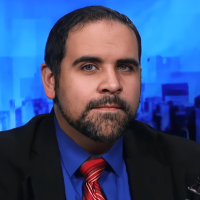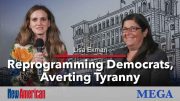
Do most Americans really support a so-called Convention of States, or more accurately an Article V Constitutional Convention, to propose amendments to the U.S. Constitution? Mark Meckler, the president of COS Action, and former U.S. Senator Rick Santorum (62-percent lifetime Freedom Index score) want you to believe so based on the findings from a new poll. But a detailed analysis of the published data cast doubts on the poll’s results.
In a recent opinion article written by Meckler and Santorum for The Epoch Times, titled “The Only Path to End the Deep State,” they said:
We’ve tried elections. We’ve supported good candidates who promised to end corruption. But nothing has worked.
That explains why new polling from The Trafalgar Group finds that a majority of Americans (65.7 percent) would support using a Convention of States to propose constitutional amendments.
Understandably, COS has been touting the results of the Trafalgar Group’s poll. In a press release posted on their website, Convention of States Action boasts “Two-Thirds of American Voters Support a Convention of States to Propose Amendments Requiring Term Limits and Reining in Federal Spending and Overreach.” To conduct the poll, COS Action partnered with the Trafalgar Group. They surveyed likely general election voters to gauge support for such a convention.
According to the published results, 65.7 percent said they would support it. Only 16.6 percent said they oppose, and 17.7 percent said they were not sure. Support for the convention also appears to transcend party lines, with 81.3 percent of Republicans in support, 63.3 of respondents listed as “No Party/Other” in support, and 50.2 percent of Democrats in support.
Is support for such a convention really that universal?
Whenever a poll is conducted, we should always ask the following questions:
• Who carried out the survey?
• What was the population?
• How was the sample selected?
• How large was the sample?
• How were the subjects contacted?
• What was the response rate?
• When was the survey conducted?
• What were the exact questions asked?
We’ll examine a few of these questions relative to the Trafalgar Group/COS poll.
First, let’s look at who conducted the poll.
The poll was conducted by the Trafalgar Group, a relatively new polling organization founded by Robert Cahaly. According to his online biography, Cahaly “has worked campaigns supporting Governors Carroll Campbell, David Beasley, Mike Huckabee, Nikki Haley, Chris Christie, and Henry McMaster; US Senators Strom Thurmond, Bob Dole, Tim Scott, and Ben Sasse; and Presidents George H.W. Bush, George W. Bush, and Donald J. Trump.” The Trafalgar Group garnered notoriety for being one of a handful of pollsters to accurately predict the outcome of the 2016 presidential election. However impressive its predictions were, it is not necessarily a marker to indicate that the group successfully produces opinion polls. Those are two very different things.
While most pollsters are transparent about who they are and what their mission is, Trafalgar provides very little information about its organization or what its survey methodologies are. How data is obtained is more important than the data itself. This is the most important fact about any statistical study, otherwise the data doesn’t mean anything.
When scrolling down at past polls Trafalgar has published on its homepage, one cannot help but notice the numerous times that the Convention of States Action logo appears on their reports. In fact, over the past year, virtually every poll published that was not an election poll bears the COS logo on it, as though COS Action has a special relationship or exclusive partnership with the Trafalgar Group. Between May 12, 2021 and August 2, 2022, the Trafalgar Group published the results of 188 surveys — 90 of which (about 48 percent) were in partnership with COS Action! In fact, COS Action is the only other organization to have its logo appear on any of the national surveys conducted by the Trafalgar Group over the past year.
Considering that COS Action is primarily a single-issue organization, exclusively dedicated to convincing state legislatures to apply to Congress to call for an Article V convention, how can such an opinion poll be trusted to not be biased in favor of COS’s desired outcome? One must also wonder if the Trafalgar Group conducted other surveys regarding support for a “Convention of States” that did not yield COS’s desired results and thus, at their request, were not published on the Trafalgar Group’s website so as not to embarrass their biggest (and seemingly only) client.
Second, how was the sample selected?
Unfortunately, the Trafalgar Group provides zero information about this. That is a HUGE piece of information, and its absence prompts even more questions, such as: What is this sample representing? Was this a random sample? Did this include people from all over the country? If so, what was the ratio of people living in rural areas versus those in suburban and urban areas? Is a particular geographic area being over-sampled or under-sampled in the survey? We simply don’t know.
Instead, the only potential “clue” that we are given is a picture of a map of the United States, which appears on the second slide of their full report. Are we supposed to assume that they sampled all over the country without them doing anything more than simply showing the reader a picture of a map? For all one knows, they could have been given a list from COS and told to sample those people. They simply don’t tell you anything to guarantee the accuracy of the results.
Third, how were the subjects contacted?
According to the “polling methodology” section of the Trafalgar Group’s website, they utilize “a mix of six different methods,” which they list as follows:
• Live callers
• Integrated voice response
• Text messages
• Emails
• Two other proprietary digital methods we don’t share publicly (Emphasis added.)
The last bullet raises major red flags for any polls conducted by the Trafalgar Group. Why would they not want to disclose that information? Not disclosing it casts serious doubts on the credibility of their polls. Any polling organization or national survey that is unwilling to disclose its methods for obtaining data cannot be trusted, as there is no way to verify the data.
Fourth, what was the response rate?
Ultimately, whatever methodologies they are using are not that great to begin with because their response rate is very low. Again, according to the second slide of the full report, Trafalgar recorded 1,078 respondents with a response rate of 1.44 percent. This means that they initially reached out to roughly 75,000 people.
Most surveys suffer from low response rates, and at least the Trafalgar Group is transparent about that aspect. Nevertheless, it is actually quite shocking, especially considering that they make the following claim on their website: “Our polls last one to three minutes and are designed to quickly get opinions from those who would not typically participate in political polls.” In fact, the COS poll seems to have consisted of just five questions, four of which were for statistical purposes (age, ethnicity, political party affiliation, and gender). This is leads us to our last question:.
What were the exact questions asked?
The primary question was framed as follows: “Would you support a Convention of States to meet and propose Constitutional Amendments focusing on term limits for Congress and federal officials, federal spending restraints, and limiting the federal government to its constitutionally mandated authority?”
The question assumes that the respondent knows what a “Convention of States” is, or at least what is meant by this deceptive phrase. As this author previously explained in The New American:
An Article V Convention is a federal function, called by the federal government to amend the federal Constitution. As such it is not a function, nor under the purview, of the state governments. As stated before, an Article V Convention is a federal Constitutional Convention. An Article V Convention is not a “Convention of States.” There is no such thing as an “Article V Convention of States.” [Emphasis in original.]
Nevertheless, what COS and the Trafalgar poll mean by the term “Convention of States” is a convention, called under Article V of the Constitution, ostensibly limited to amending the Constitution, the process of which, COS claims, will be controlled entirely by the state legislatures. For more information about why this is not true, COS Action’s deceptive use of the phrase “Convention of States,” and how and why they falsely distinguish it from the historically accepted and accurate term “Constitutional Convention,” read the article titled “Article V Convention: Will It Work?,” published in the July 11, 2022 Special Report of The New American.
The respondents should have first been asked if they even knew what an Article V convention, or so-called “Convention of States” is, rather than assuming such information on the part of the respondent. When a survey question assumes information on the part of the respondent, that creates a possible false response in that the respondent does not understand the question (or a key aspect of it) and may guess at an answer rather than appear to be ignorant about the subject matter.
Furthermore, term limits for “federal officials” could easily be interpreted to mean term limits for Supreme Court justices, which may, in part, account for the high number of self-identified Democrats who support a convention. The same could be said about the part of the question framed as “limiting the federal government to its constitutionally mandated authority” (emphasis added). Again, this assumes that every respondent knows what the federal government’s “constitutionally mandated authority” is, which to most liberals, progressives, and socialists, who believe that the Constitution is a “living document,” means something entirely different than it does to strict constructionists or constitutionalists. The question is framed vaguely enough to easily garner a positive response, even if the respondent is not familiar with what a “Convention of [the] States” is.
All of this needs to be taken into account when deciding on whether or not to accept the results of this COS national survey.
If not a “Convention of States,” as COS wrongly calls the convention method spelled out in Article V of the Constitution, then what should be done to rein in the government?
The federal Constitution already limits the power and jurisdiction of the federal government, and specific allowed powers are enumerated within the Constitution. Therefore, the answer is not to change the Constitution, but rather to enforce it as it is written. The proper remedies are enforcement (of the Constitution) and nullification (of all unconstitutional federal actions, laws, executive orders, court rulings, etc.). The act of nullification is clearly grounded in Article VI of the Constitution. Article VI binds state legislators — along with judges and members of Congress and the executive branch — by their oath “to support this Constitution.” Furthermore, the Bill of Rights (the first 10 amendments) declare what the federal government cannot lawfully do.
The real problem is that America’s citizens do not know or understand the existing Constitution.
To fix this underlying issue, there is no substitute for a well-educated electorate that is coordinated to act in an organized manner. This is what The John Birch Society (the parent organization of this publication) is all about.
Proper educational materials, action tools, and an organizational structure are necessary to expose and stop the deliberate acts against Americans’ individual liberties and the Constitution, including the current push for a Constitutional Convention under any name. The John Birch Society provides these essential resources.
Those interested in safeguarding American liberty and the Constitution should consider membership in The John Birch Society. The John Birch Society provides the leadership and tools necessary to stop any and all attempts to open up the Constitution at a convention, and to enforce the Constitution as the Founding Fathers intended. Visit JBS.org/ConCon for more information and resources.




